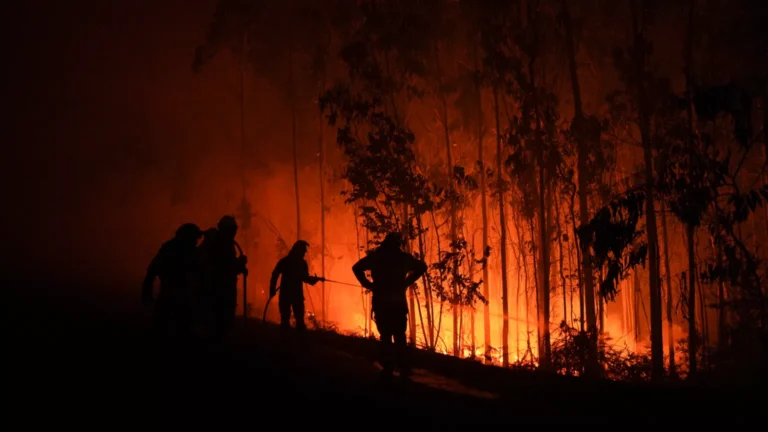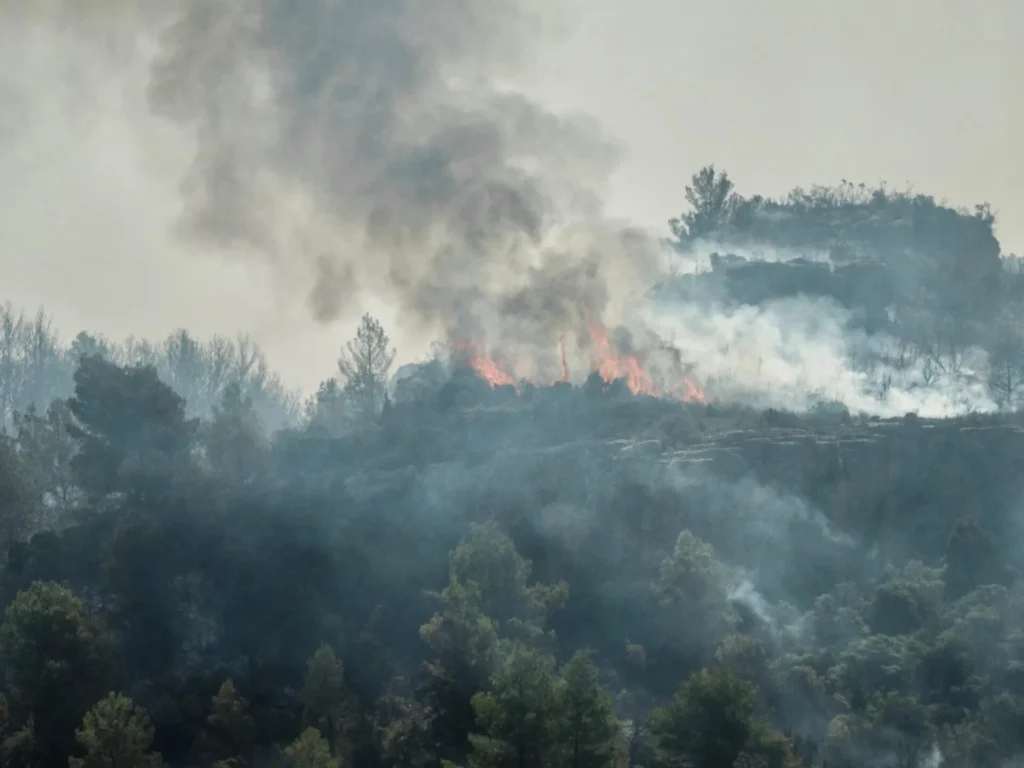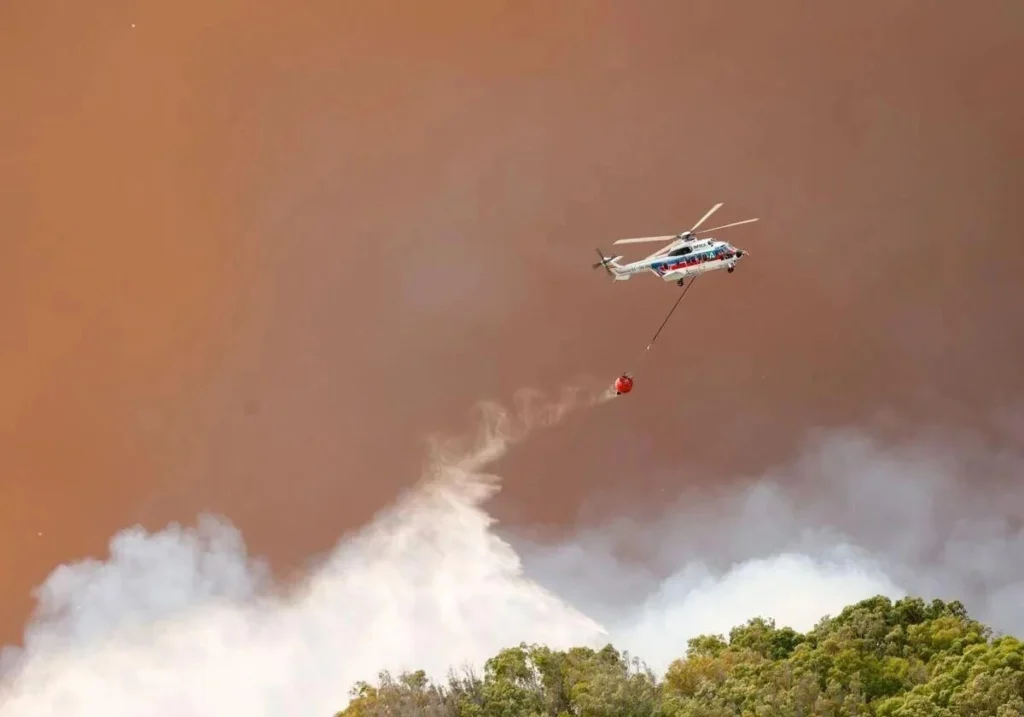Critical Truths About the Tarifa Wildfire 2025: Mass Evacuations, Climate Threats, and Emergency Response

Tarifa wildfire 2025: view of the fire in La Peña, Cádiz, during massive emergency operations. Photo: Perplexity 6/8/2025
August 6, 2025 Hour: 10:05 pm
Tarifa wildfire 2025 is stabilized after 1,500 people evacuated and a massive emergency operation. Discover the causes, response, and climate context behind Spain’s latest fire crisis.
Related: Spain Rejects Israel’s Intent to Occupy Gaza and the West Bank
7 Critical Truths About the Tarifa Wildfire 2025: Mass Evacuations, Climate Threats, and Emergency Response
On August 6, 2025, the Tarifa wildfire 2025 was officially declared stabilized after a 24-hour emergency that forced the evacuation of approximately 1,500 people and over 5,000 vehicles from campsites, hotels, and residential areas in the southern Spanish town of Tarifa, Cádiz. The fast-moving blaze, which erupted on Tuesday in the La Peña area, sent thick plumes of smoke across the Strait of Gibraltar and triggered a large-scale emergency operation involving 17 aerial units, 125 firefighters, and multiple security forces.

The Tarifa wildfire 2025 is not an isolated event—it’s a symptom of a climate emergency gripping the Mediterranean.
Andalusian Interior Minister Antonio Sanz confirmed the fire’s stabilization but warned that hotspots remain active, and the situation could reactivate due to strong winds and extreme heat—hallmarks of Tarifa’s climate.
“We are not out of danger,” Sanz stated. “The wind is our main enemy. We must remain on high alert.”
Despite the progress, the incident has left a deep mark on the region, both environmentally and economically. Tarifa, a key tourist destination known for its beaches and wind sports, is in the midst of its peak season, and the fire has led to cancellations, business losses, and trauma for residents and visitors alike.
When a wildfire hits during high season, it’s not just a natural disaster—it’s an economic and social crisis.
Tarifa Wildfire 2025: A Race Against Time and Nature
The fire began on Tuesday, August 5, with initial reports pointing to a possible origin in a caravan at the La Torre campsite—though official investigations are still ongoing. Fueled by dry vegetation and the region’s characteristic Levante wind, the flames spread rapidly across rugged terrain, threatening residential zones and tourist infrastructure.
In a climate-changed world, a single spark can ignite a regional emergency.
Emergency services acted swiftly. The Andalusian Forest Fire Extinguishing Service (INFOCA) deployed 11 forest firefighting units, mobile meteorology teams, and ground support vehicles, while helicopters and air tankers conducted continuous water drops throughout the night.
Evacuations were carried out from key locations, including:
- Punta Sur, La Torre, Tres Mares, Copacabana, and Dulce Nombre hotels,
- Multiple campgrounds and beachside chiringuitos (beach bars).
The speed of evacuation saved lives—many residents fled with only personal belongings, leaving homes and vehicles behind.
The Tarifa City Council activated emergency shelters at the La Marina Sports Pavilion and the Interjoven Youth Center, where dozens of evacuees spent the night. Local authorities praised the coordination between civil protection, police, and volunteer groups, with off-duty officers from the Guardia Civil and local police joining the effort.
External Link: INFOCA – Andalusian Fire Service
External Link: Copernicus Emergency Management Service – Wildfire Monitoring
Geopolitical Context: Europe on Fire – A Climate Emergency Unfolding
The Tarifa wildfire 2025 is not an isolated incident—it is part of a broader pattern of extreme fires across Europe, driven by record-breaking temperatures, prolonged droughts, and changing weather patterns linked to climate change.
What happens in Tarifa is a warning for the entire Mediterranean.
Just hours after the Tarifa fire, southern France faced its own disaster: a massive wildfire near Narbonne burned over 16,000 hectares and claimed one life, marking the region’s deadliest natural disaster in years. French authorities described the fire as “unprecedented in scale,” with entire villages evacuated.
Climate change does not respect borders—it is a transnational crisis.
Spain is no stranger to wildfires. In 2025 alone, other major fires have erupted in:
- Montehermoso and Galisteo (Cáceres),
- Las Lapas, Constantina (Seville),
- Galicia and Asturias in the north.
These fires are occurring earlier and with greater intensity than in previous decades. The European Forest Fire Information System (EFFIS) reports that over 80,000 hectares have burned in Spain so far in 2025—double the five-year average.
The fire season is no longer seasonal—it’s year-round.
Scientists warn that the Mediterranean basin is a climate change hotspot, warming 20% faster than the global average. This means longer dry spells, more intense heatwaves, and ecosystems that are increasingly vulnerable to ignition.
Emergency Response: Success Amidst Crisis
Despite the challenges, the Andalusian emergency response has been widely praised. President Juanma Moreno commended the “heroic work” of INFOCA and all emergency personnel, emphasizing the efficiency and coordination that prevented loss of life.
When institutions work together, lives are saved.
The operation involved:
- 17 aerial units, including helicopters from the Ministry of Agriculture and Fisheries,
- 125 ground firefighters,
- Meteorological monitoring teams to predict fire behavior,
- Local police and civil protection managing evacuations.
The use of real-time satellite data and drones allowed for precise targeting of fire fronts, while public alerts via SMS and social media kept residents informed.
However, challenges remain. The La Peña area is rugged and difficult to access, making ground operations risky. Moreover, the persistent wind—a defining feature of Tarifa’s geography—complicates containment and increases the risk of reignition from embers.
Economic and Social Impact: A Blow to Tourism and Community
For Tarifa, the fire is not just an environmental disaster—it is an economic catastrophe. As one of Andalusia’s most popular summer destinations, the town relies heavily on tourism revenue during July and August.
A single day of fire can erase months of economic planning.
Mayor José Santos, a local business owner, described the situation as a “personal and economic tragedy” for the community.
“We are in high season. People are canceling bookings. Businesses are losing income. The image of Tarifa is at risk,” he said.
Eyewitnesses recounted scenes of chaos: families fleeing in cars, children crying, and tourists abandoning their campsites with only passports and phones. One evacuee told RTVE:
“We didn’t have time to think. We grabbed the kids and ran. The smoke was everywhere.”
While evacuees have begun returning, access to some areas remains restricted, and psychological support services are being deployed to help those affected.

Climate Change and the New Normal
The Tarifa wildfire 2025 must be understood as part of a larger climate reality. According to the Intergovernmental Panel on Climate Change (IPCC), the frequency and intensity of wildfires in southern Europe will increase significantly in the coming decades.
These fires are not “natural” disasters—they are climate disasters.
Key factors include:
- Temperatures rising 1.5°C above pre-industrial levels,
- Longer droughts and reduced rainfall,
- More frequent heatwaves,
- Increased fuel load from dry vegetation.
Experts warn that current firefighting capacity may be overwhelmed in the future. Spain and other Mediterranean countries must invest in:
- Prevention programs (controlled burns, forest management),
- Early warning systems,
- Climate-resilient infrastructure,
- International cooperation on fire response.
Conclusion: A Wake-Up Call for the Mediterranean
The stabilization of the Tarifa wildfire 2025 is a relief—but it is not a victory. It is a warning. A fire that forced the evacuation of 1,500 people in a single night is not an anomaly. It is a preview of what lies ahead if climate action is not accelerated.
The fight against wildfires is not just about water and helicopters—it’s about reducing emissions, protecting forests, and preparing communities.
Spain’s emergency services deserve recognition for their swift and effective response. But long-term safety will depend on national and global climate policies, not just heroic efforts on the ground.
As the smoke clears over Tarifa, one truth remains: the era of predictable seasons is over. The Mediterranean is burning—and the world must act before the next fire season becomes even more devastating.
External Link: BBC News – Europe’s 2025 Fire Season: A Climate Crisis Unfolding
Author: JMVR
Source: Sur in English

